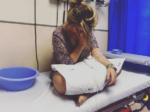How Can Hospitals Better Serve Rare Disease Communities?
Written by |

“It’s just anxiety.”
“It’s just stress or PTSD.”
“You just need more rest.”
For many of us in the rare disease community, these comments aren’t uncommon. As someone with seronegative myasthenia gravis (MG), I hear them almost every time I go to the emergency room.
I experience bulbar symptoms, including difficulty chewing or swallowing, and respiratory weakness, which causes difficulty breathing. My atypical presentation of MG has given me unique insight into the way many of those experiencing acute exacerbations of a chronic disease are treated in the ER.
One experience from 2017 highlights just how unique we myasthenics are. I had recently received a working diagnosis of MG and was having difficulty breathing. My husband hates when I have breathing issues because he feels helpless to assist me, so he insisted I go to the ER.
The attending doctor was familiar with MG, but because my presentation is atypical, they thought my symptoms must have been caused by something else. I have a PTSD diagnosis in my chart, so any difficulty breathing is often attributed to either that or anxiety.
The doctor offered me an intravenous medication to help me calm down and breathe better. Due to my training as a medic in the Army, I realized it was an anti-anxiety medication. I refused treatment and we left the ER.
Where is the disconnect?
Unfortunately, these types of situations can lead to distrust of healthcare professionals and affect the care a patient receives.
Because myasthenia gravis is a rare disease, it’s typically not taught in depth, if at all, to people pursuing a general medical degree. If a patient appears to know more about their disease than their provider, sometimes it can create tension or even conflict. Some providers don’t want to admit that their knowledge about a particular condition is limited, and patients want to be heard and respected.
In my experience, some medical providers don’t seem to value listening to their patients, especially those of us with rare or chronic illnesses. Every MG patient has a different presentation and will require different treatments for their specific symptoms. Our knowledge and experience are invaluable, since treating MG is anything but textbook.
Medicine is an ever-evolving practice, and researchers are constantly learning new information and developing new therapies. To better serve the rare community, healthcare providers must be open to continuing their education. And as rare patients, we need to give our medical providers support, guidance, and encouragement to uphold the Hippocratic oath.
Communication is key
Hospital administrators should encourage open communication between providers and patients. It’s important to foster an air of cohesion and calmness rather than one of divisiveness and combativeness.
If we as patients have previously been dismissed by medical staff or struggled to obtain treatment, trusting that our providers have our best interests at heart can be difficult, but it may also lead to better care.
So how do we bridge this divide? How can patients and providers come together to ensure that the patient receives proper and effective treatment?
My first suggestion is for hospitals and clinics to create a registry for local patients with chronic or rare diseases. Enrolling will cause their chart to be flagged when they visit the ER, and staff will be provided with pertinent information about their condition, including possible symptoms and acute issues, helpful treatments, and medications to administer or avoid. Having access to a patient’s chart is one thing, but having this type of information readily available would benefit both patients and providers immensely.
I also encourage both sides to practice calm but direct communication. Patients aren’t always blameless when encountering healthcare providers. We must advocate for our well-being without being rude.
If you’ve read my other columns, you may have noticed a theme of communication. Without open and honest communication, nothing productive can be accomplished. Even the faintest whisper can move mountains.
Note: Myasthenia Gravis News is strictly a news and information website about the disease. It does not provide medical advice, diagnosis, or treatment. This content is not intended to be a substitute for professional medical advice, diagnosis, or treatment. Always seek the advice of your physician or other qualified health provider with any questions you may have regarding a medical condition. Never disregard professional medical advice or delay in seeking it because of something you have read on this website. The opinions expressed in this column are not those of Myasthenia Gravis News or its parent company, Bionews, and are intended to spark discussion about issues pertaining to myasthenia gravis.




Lovina Wolgamott
This would be very beneficial.
Maika Bates
Thank you, Shawna Barnes, for your article on managing a visit to an Emergency Room. Understandably, staff there don't see many MG patients, nor other patients with rare disorders. If you arrive at the ER with breathing difficulties you could be on a fast and slippery slope to respiratory arrest. The patient and advocate need to be well equipped with information about the patient's condition and medications. And, as you said, it is not helpful to be rude. Once, I met an ER physician in a different setting outside the hospital. I asked him if he saw me in the ER and I asked if he would call my neurologist about my condition. He said no. No explanation. To me, this was more than rude, Later I realized why he said no. You can look at the ER as a giant diagnosis factory. It's not Shock Trauma. Often ER staff need to either fix you quickly, send you home, or move you out to somewhere else where you can be treated. At www.myasthenia.org, website of The Myasthenia Gravis Foundation of America. there are very helpful articles on how to navigate the hospital experience. Here in Maryland First Responders look on or inside your refrigerator for your health instructions. It is also good to keep a package in your car, your purse, or pocket. Thank you, again for addressing such an important topic.
Shawna Barnes
Thank you for your insight Maika. I have many of the articles from the MGFA printed and easily accessible on my phone as well. They have been a huge help when needing to advocate for myself in emergent situations.